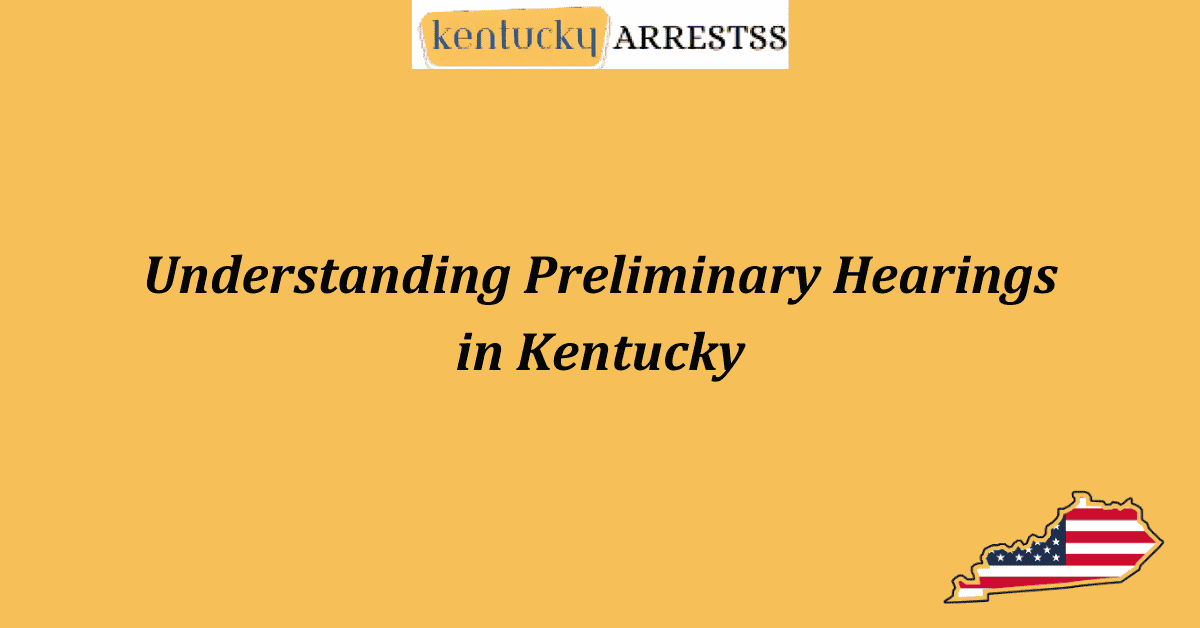Understanding Preliminary Hearings in Kentucky
In Kentucky, preliminary hearings play a crucial role in the legal process. These hearings serve as the initial step in determining whether there is enough evidence to proceed to trial. During a preliminary hearing, the prosecution presents evidence to show probable cause that the defendant committed the alleged crime. It is a critical stage where a judge assesses the strength of the case and decides if it should move forward.
Individuals involved in a preliminary hearing in Kentucky should understand the significance of this legal proceeding. It offers a glimpse into the prosecution’s case and allows the defense to challenge the evidence presented. By grasping the ins and outs of preliminary hearings, individuals can navigate the legal system with more confidence and knowledge. It is essential to be well-informed about the purpose and process of preliminary hearings in Kentucky to ensure a fair and just legal outcome.
Role of Preliminary Hearings in Kentucky
A preliminary hearing is a crucial part of the legal process in Kentucky, serving as a preliminary step before a trial. This hearing allows the court to determine whether there is enough evidence to proceed with a trial and if the defendant should be held accountable for the alleged crime. It plays a significant role in the legal system by ensuring that the defendant’s rights are protected and that justice is served.
Importance of Evidence Presentation
During a preliminary hearing, the prosecutor presents evidence to establish probable cause that the defendant committed the crime. This evidence may include witness testimonies, physical evidence, and other relevant information. It is essential for the prosecutor to present convincing evidence to demonstrate that there is a reasonable basis for the charges against the defendant.
Distinction Between Preliminary Hearings and Trials
It is important to note that preliminary hearings differ from trials in several ways. While trials involve a more extensive examination of evidence and witness testimonies, preliminary hearings focus on establishing probable cause. Additionally, preliminary hearings do not determine the defendant’s guilt or innocence but rather assess whether there is enough evidence to proceed with a trial.
Defendants’ Rights During Preliminary Hearings
Defendants have specific rights during preliminary hearings, including the right to legal representation, the right to cross-examine witnesses, and the right to challenge evidence presented against them. These rights are crucial in ensuring a fair and just legal process for the defendant.
Significance in Safeguarding Legal Rights
Preliminary hearings play a significant role in safeguarding the legal rights of defendants. By allowing defendants to challenge evidence and ensuring that there is sufficient proof to proceed with a trial, preliminary hearings help protect individuals from unwarranted prosecution and uphold the principles of justice.
Ensuring Fairness in the Legal System
One of the primary purposes of preliminary hearings is to ensure fairness in the legal system. By providing an opportunity for both the prosecution and the defense to present their case and evaluate the strength of the evidence, preliminary hearings contribute to a more transparent and equitable legal process.
Judge’s Decision-Making Process
During a preliminary hearing, the judge plays a crucial role in evaluating the evidence presented by the prosecutor and determining whether there is probable cause to proceed with a trial. The judge’s decision-making process is based on the information presented during the hearing and the legal standards for establishing probable cause.
Attorney’s Role in Challenging Evidence
Defense attorneys play a vital role in challenging the evidence presented during a preliminary hearing. They may cross-examine witnesses, object to evidence that is irrelevant or improperly obtained, and present arguments to undermine the prosecutor’s case. By advocating for their clients’ rights and challenging the strength of the evidence, defense attorneys help ensure a fair legal process.
Process of Determining Probable Cause
The process of determining probable cause during a preliminary hearing involves a thorough examination of the evidence presented by the prosecutor. The judge must assess whether the evidence is sufficient to establish that it is more likely than not that the defendant committed the alleged crime. This determination is crucial in deciding whether the case should proceed to trial.
Frequently Asked Questions
Our Frequently Asked Questions section aims to provide detailed information on Understanding Preliminary Hearings in Kentucky. Below are some commonly asked questions and detailed explanations to help you navigate through this legal process.
What is a Preliminary Hearing?
A preliminary hearing is a legal proceeding where the prosecution presents evidence to a judge to determine if there is enough probable cause to proceed with a trial. It is not a trial but a way to establish whether there is sufficient evidence for the case to move forward.
How does the Preliminary Hearing process work in Kentucky?
In Kentucky, a preliminary hearing must be held within a certain number of days after an individual is arrested. During the hearing, the prosecution presents evidence, and the defense has the opportunity to cross-examine witnesses. The judge then decides if there is enough probable cause to proceed with the case.
What happens if probable cause is found at the Preliminary Hearing?
If the judge determines that there is enough probable cause, the case will proceed to trial. The defendant will be formally charged, and the next steps in the legal process will be determined.
Can evidence be challenged at a Preliminary Hearing?
Yes, evidence presented at a preliminary hearing can be challenged by the defense. This can include questioning the credibility of witnesses, challenging the validity of evidence, or raising any legal issues that may impact the case.
Is it important to have legal representation at a Preliminary Hearing?
Having legal representation at a preliminary hearing is crucial as it allows for proper defense against the evidence presented by the prosecution. A skilled attorney can challenge evidence, cross-examine witnesses, and ensure that your rights are protected throughout the process.
What are the possible outcomes of a Preliminary Hearing?
After a preliminary hearing, the judge may dismiss the charges if there is insufficient evidence, or they may decide to proceed with the case. The outcome will vary depending on the evidence presented and the judge’s decision regarding probable cause.






